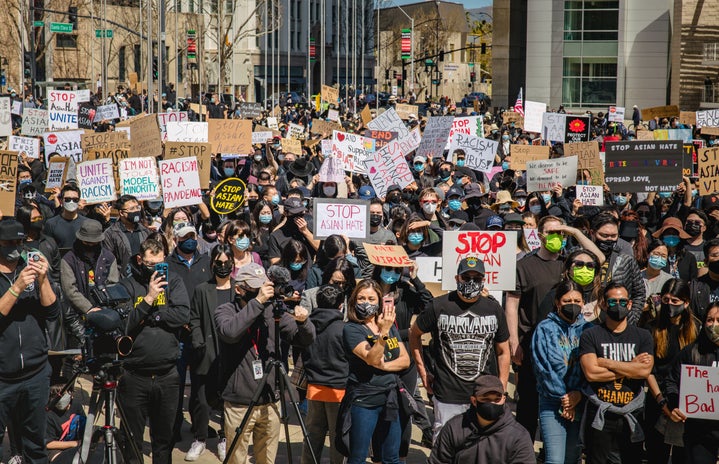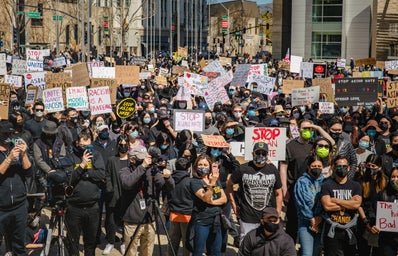There has been a rise in hate crimes against Asian American individuals since the start of the COVID-19 pandemic and, in the past weeks, there has seem to be an even more apparent spike in violent acts of racism.
For the April Editors’ Blog, Her Campus American’s Editorial team wanted to highlight ways to stand in solidarity with the AAPI community, highlight some incredible individuals and organizatiosn within it and help to put a stop to these heinous attacks.
- Organizations to Support in the Fight Against Asian Hate
-
After the racially charged massacre in Atlanta, Georiga, killing eight people, including six Asian women, not enough is being done to protect Asian Americans from increased levels of hate, discrimination, and violence. In response to the widespread inaction, Stop AAPI Hate is a coalition dediated to documenting anti-Asian hate crimes and discrimination. They also list organizations to support or donate to. This could help support the AAPI community and put anti-discrimination legislation in action.
Stop AAPI Hate: is a national coalition documenting and sharing resources about anti-Asian discrimination.
Red Canary Song: a grassroots collective supporting labor rights for Asian migrant workers and sex workers.
AAPI Women Lead: supports AAPI women and girls with workshops and and research, and addresses issues like gender-based and racial discrimination and sexual harassment within the AAPI community.
Asian Americans Advancing Justice – Atlanta: is a nonprofit advocacy group protecting the rights of Asian-Americans, Native Hawaiians, and Pacific Islanders in Georgia and the Southeast United States.
While these are only a few organizations supporting Asian Americans, they are imperative in furthering the fight against AAPI discrimination and hate. If you’re able, support and donate, even the small difference can make the largest impact.
–Hannah Andress
- Supporting Asian American Journalists
-
As the Asian community faces a disturbing rise in violence due to the coronavirus pandemic, Asian American journalists continue to be at the forefront of these anti-Asian attacks while also having to bear the burden of reporting on the pain of their community.
“The professional challenges for AAPIs are complicated and rooted in systemic problems. The range of concerns raised by our members are deeply concerning, and we urge newsrooms to listen to, learn from, and advocate for their employees,” the Asian American Journalists Association said in a statement.
It is important to recognize and support Asian American and Pacific Islander (AAPI) journalists in the field. Their duties as journalists are extremely tolling, so by reading AAPI articles written by AAPI journalists, it just further reassures their place in the news cycle and in newsrooms. Another easy and effective way of supporting AAPI journalists is by donating to the Asian American Journalists Association.
Here are a few AAPI journalists to follow, support, and read from right now:
Jiang is the senior White House correspondent for CBS News and has been one of many AAPI journalists to speak out in the height of Asian hate. In an interview with CBS, Jiang explains how the number of Asian American journalists who cover the White House, specifically, is extremely low and the kind of pressure that puts on her as a journalist. “When you are one of a few, you carry a heavy burden to make sure that you are asking questions on behalf of people who don’t have a voice.”
Lee is the president of the Asian American Journalists Association and reports for The Washington Post. The Post’s diversity initiative “About US” features a captivating essay written by Lee about her experiences as an Asian American journalist. In this essay, she writes “In every news job I’ve had, I have been confused with another Asian woman reporter — a steady undercurrent in my career. I’m hardly alone in experiencing this.”
Shyong is a columnist for the Los Angeles Times and is known for his knack for building bridges between communities. He has also started a podcast called “Asian Enough” which highlights personal stories about being Asian American and unpacks the Asian identity.
Inocencio is the first Asian American CBS News Asia correspondent, so for the latest news on Asia, follow him. The Filipino and Singaporean journalist covers the Hong Kong protests, posts frequent Twitter threads with live updates, and serves as the Senior Vice President for the Asian American Journalists Association.
This is obviously a very short list of the many credible AAPI journalists you should follow and read from right now, so this should serve as a starting point for a more diverse news feed. Closely following any journalist makes such a difference, but to read from AAPI journalists now can make an impact.
–Christina McAlister
- Supporting Asian American Women
-
Asian American women experience discrimination at the intersection of race and gender-based biases. For centuries, Asian American women have been victims of over-sexualization, fetishization, sex trafficking, and discriminatory stereotypes. As the rates of violence against Asian Americans continue to rise going into the second year of the COVID-19 pandemic, we must reckon with the impact that this culture has on Asian American women and learn how to support them socially, legally and personally.
Of the eight people murdered during the Atlanta spa shootings in March- Soon Chung Park, Hyun Jung Grant, Yong Ae Yue, Suncha Kim, Daoyou Feng, Xiaojie Tan, Delaina Ashley Yaun and Paul Andre Michels- six were Asian American women. This violent attack occurred during a precocious time of rising anti-Asian sentiments in the United States amidst the Coronavirus outbreak. Although the shooter has not been officially charged with committing a hate crime, many sociologists have commented on the related impact of sexualized racism and anti-Asian hate plaguing the country.
Following the shooting, many Asian American women have turned to social media in order to speak out against America’s long history with the sexualization and fetishization of Asian women. The media may be seeing a spike in stories regarding anti-Asian discrimination, but this kind of violence has been long-rooted in American history. In 1875 the United States government passed the Page Act, which barred Chinese women from immigrating to the United States under the pretense that they were sex workers. And throughout the 20th century, the United States military participated in the sex trafficking of Asian women, encouraging sexual violence and discriminatory stereotypes against Asian women in general.
Fighting against anti-Asian hate has become an increasingly important notion as we continue to see a rise in racist sentiments and actions across the country. The importance of listening to Asian American women and hearing about their experiences with radicalized and sexualized violence can not be understated. We must also fight back against the push for increased policing and the criminalization of sex workers and the impact that this has on Asian female sex workers and immigrants.
The fight against anti-Asian hate and violence is neither simple nor easy, but it is incredibly important. We can and must take any steps we can at both personal and systemic levels to support Asian American women and challenge anti-Asian sentiments in the United States overall.
–Nicole Scallan
Her Campus American continues to support all those who have been victims of discrimination due to their identify, race or ethnicity. We will continue to report on injustices until there is justice and equality.




